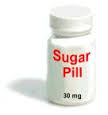If you take a prescription drug from your doctor and it sorts your problem out you’ll probably credit the doctor and the drug for fixing your problem. The credit to the doctor may be well placed, but the credit to the drug might not be.
Before drugs hit the market they have gone through a number of trials. One of those trials may have been a placebo controlled trial. A placebo is an inactive medicine, e.g. a sugar pill.
It is estimated that 35% of people respond to a placebo, these responses are physical as well as psychological, e.g. even things like ulcers can heal just as well in some people with a sugar pill as they can with a real drug.
So this raises some questions. How much does trust in your doctor and/or faith in the drug comes into play in getting better?
Example of Placebos at Work
In 1996 an experiment was carried out on a group of students (I’m sure they got paid some beer money for it). They were told a new painkiller was being trialled on them. This came in a form of a brown lotion and was painted on one index finger.
Both index fingers were squeezed in a vice (most students will do anything for beer money).
A large proportion of the students reported significantly less pain in treated finger (even though there was no painkiller in it, but they didn’t know that)
Placebos Cause a Problem for Doctors
Whenever a drug is taken the person who has prescribed it can’t honestly be sure it’s the drug at work or the patient’s mind. This is because about 35% of people would have improved anyway – with a sugar pill. For a drug to be considered effective it has to significantly out perform this ‘placebo effect’
A small trial carried out with orlistat (a weight loss drug) in overweight adolescents in 2006, demonstrates the difficulty drug companies are up against. Half of them got the sugar pill and half of them got the active drug. This was the conclusion: “In this study of obese adolescents, orlistat did not significantly reduce BMI in comparison with placebo at 6 months” *
Both groups lost a small amount of weight. The group taking the sugar pill thought they were taking a real drug, and they ended up losing some weight. The real drug group experienced significant side effects compared the sugar pill group. So orlistat works well at causing side effects but, in this study, it didn’t work well at helping people lose weight.
Never-mind – you can keep doing trials until you get the answer you want.. I’ll write on that subject one day.
Have an Uber Health week
Dr Julie
PS Congratulations to Janet for winning April’s free place on Uber Slim, my online weight loss program.
If you would like a chance to win the one on offer in May make sure you’re signed up to the newsletter, so you know the one easy question to answer.
*Endocr Pract. 2006 Jan-Feb;12(1):18-28.Randomized, double-blind, placebo-controlled trial of orlistat for weight loss in adolescents. Maahs D1, de Serna DG, Kolotkin RL, Ralston S, Sandate J, Qualls C, Schade DS.
